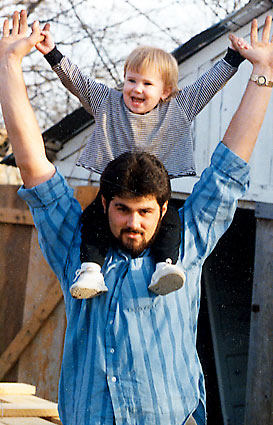Abolish the Death Penalty
Cameron Todd Willingham with his daughter
CHRISTIAN MESA: Cameron Todd Willingham was executed in 2004 for a crime he didn’t commit. A fire in his home 12 years earlier killed his three daughters. Investigators claimed arson. Prosecutors blamed Cameron and the jury found him guilty. Cameron maintained his innocence, however, and evidence later proved him right. The fire was an accident.
Cameron’s execution, however, wasn’t an accident. It resulted in the government that Cameron entrusted with his case getting it wrong and killing him because of it.
The death penalty is wrong. It’s wrong because it’s not uncommon for the government to convict innocent people. It’s wrong because it disproportionately affects people of color. And it’s wrong because we, as a society, have matured beyond the barbarism that is inherent to brutally murdering someone as punishment.
We should abolish the death penalty.
Cameron’s story is not unique. Since 1971, 164 people have been freed from death row because of new evidence. A recent study indicated that 4.1% of those sentenced to death are in fact innocent. By any standard of decency, the government wrongfully putting one life on the line is wrong. The fact that it happens around 4% of the time is staggering. It’s time we accept the fact that prosecutors make mistakes, and the consequences for those mistakes should not be the death of an innocent life.
Cameron is, however, in the minority in one aspect: he’s white. People of color are disproportionately sentenced to death. The race of the victim also matters. Despite people of color representing half of all murder victims, they represent 77% of victims in all capital punishment cases. Racism plays a deciding factor in who is put to death.
The death penalty today is unusual. Twenty states have abolished it. In reality, the death penalty is applied arbitrarily. Only 10% of counties have ever sentenced someone to death. Only 1% return one or more death sentences a year. The country has largely rejected the death penalty in favor of life sentences and the rest of the world has followed. Only ten highly developed countries still have capital punishment, leaving the United States in the company of Saudi Arabia and Kuwait.
The fact that the death penalty is no longer common makes it less powerful as a deterrent. Indeed, one of the arguments of proponents of the death penalty is that it deters criminal behavior. Except, there’s no evidence of that being the case. The vast majority of murders are crimes of passion committed in the moment. When only 1% of counties regularly sentence people to death, it’s easy to see why the death penalty does not in fact deter crime.
The death penalty today is cruel. It’s a common misconception that we have solved the savagery of the death penalty today with lethal injection. Just because we have rejected firing squads, hanging, and the electric chair as relics of a past society does not mean we have overcome our barbaric past. Death by lethal injection can be just as cruel.
There are numerous instances where executions by lethal injection have left victims in clear, distressing pain. In one case, a man was stabbed with a needle for two and a half hours before the execution was called off, leaving him bloodied and emotionally broken. Chief Justice Warren wrote that the idea of “cruel and unusual punishment” in the 8th Amendment “must draw its meaning from the evolving standards of decency that mark the progress of a maturing society.”
We have evolved since those words were written. We have gone from a society that hosed and beat African-Americans to a society that elected our first black President. We have accepted that people may love who they wish, that women deserve an equal opportunity at success. Now it is time to accept that we are can overcome our barbaric tendencies and abolish the death penalty.
We are more mature than a society that kills as a punishment for killing. We can overcome the anger we feel at heinous crimes and treat even the worst of our society with decency. We owe it to Cameron and we owe it to ourselves.

